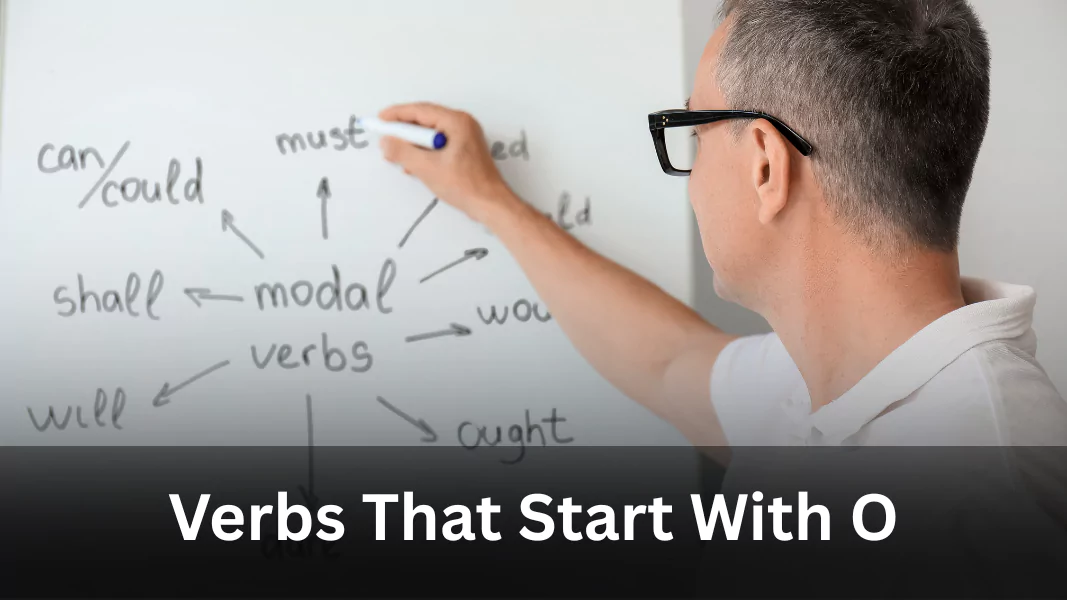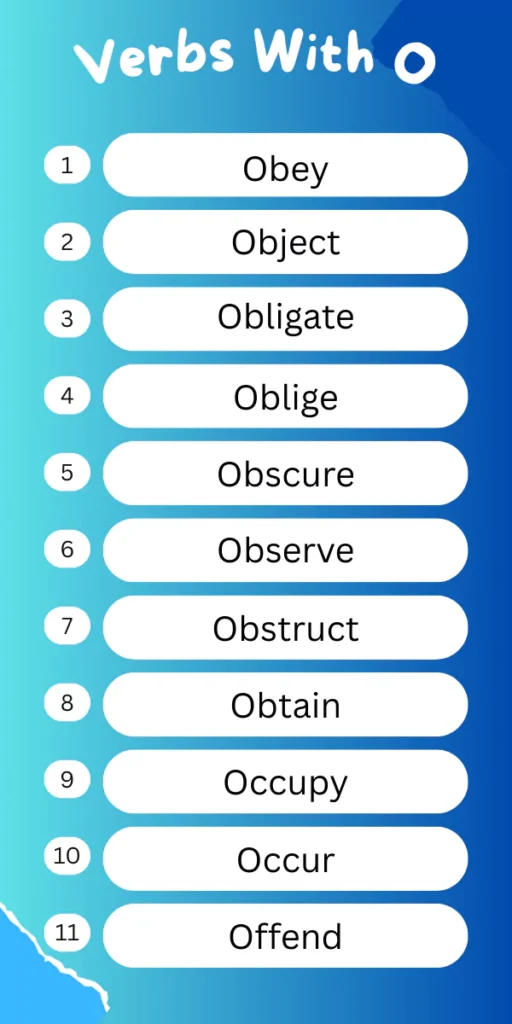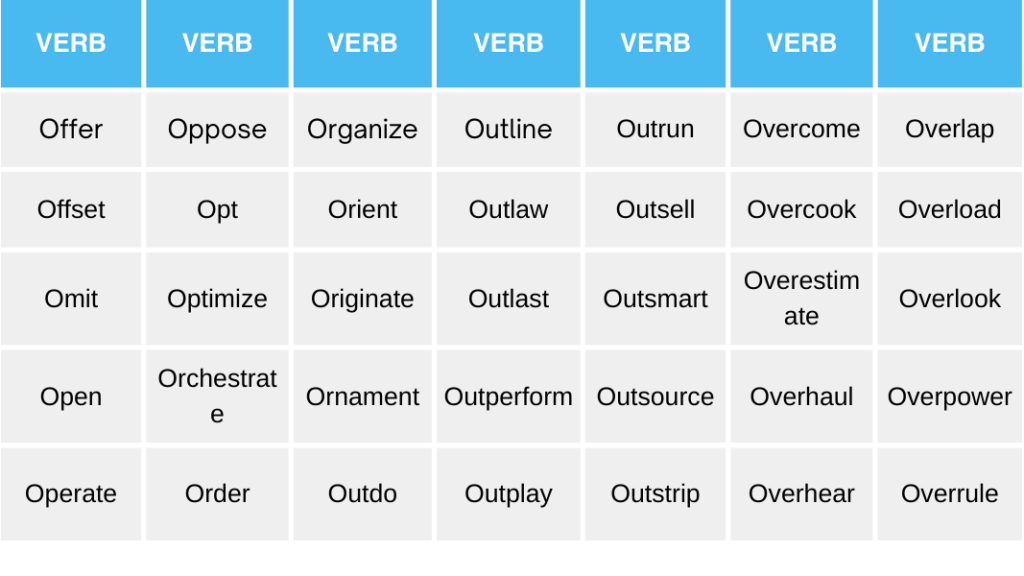Verbs That Start With O – List, Meanings & Examples in English

The letter O, nestled in the middle of the English alphabet, opens the door to a collection of impactful and inspiring verbs. From everyday actions like obtain and offer to more expressive ones such as overcome and outshine, O-verbs carry a unique sense of originality and optimism. While verbs beginning with O may seem less common compared to other letters, they hold an important place in our vocabulary, enriching writing, speech, and self-expression.
List of Verbs That Start With O
The list of verbs that start with O covers a wide variety of meanings, from simple everyday actions to powerful and inspiring expressions. These verbs can help you describe achievements, emotions, and activities with precision and flair. Whether you’re writing creatively, practicing English, or looking for impactful words to improve your vocabulary, this collection will provide you with versatile and valuable options to use in different contexts.

Common Verbs Starting With O
- Obtain – to get or acquire something.
Example: She obtained her passport yesterday. - Offer – to present or provide something.
Example: He offered his seat to the elderly woman. - Open – to move something so it is not closed.
Example: Please open the window for fresh air. - Observe – to watch carefully.
Example: The scientist observed the reaction closely. - Occupy – to fill or take up space/time.
Example: The kids occupy the living room every evening. - Own – to possess something.
Example: They own three dogs. - Order – to request or command.
Example: She ordered a coffee at the café. - Operate – to control or run something.
Example: He operates heavy machinery at work. - Organize – to arrange or plan systematically.
Example: She organized the files neatly. - Outline – to summarize the main points.
Example: The teacher outlined the chapter before class. - Overcome – to successfully deal with a difficulty.
Example: He overcame his fear of heights. - Opt – to choose or decide.
Example: They opted for the cheaper plan. - Omit – to leave out or exclude.
Example: Don’t omit any details in the report. - Overlook – to miss noticing something.
Example: She overlooked a small mistake in the essay. - Occupy – to engage the attention or time.
Example: The movie occupied us for two hours.
Positive Verbs Starting With O
| Verb | Meaning | Example |
|---|---|---|
| Offer | to give or extend help | He offered support during tough times. |
| Outshine | to perform better or excel | She outshined everyone in the contest. |
| Overcome | to defeat challenges | They overcame great odds to succeed. |
| Optimize | to make the best use of | The company optimized its resources. |
| Organize | to bring order | She organized a charity event. |
| Orchestrate | to arrange skillfully | He orchestrated a successful campaign. |
| Own | to embrace or take pride in | She owned her achievements proudly. |
| Open | to make accessible | The teacher opened new opportunities for learning. |
| Overjoy | to fill with happiness | The surprise party overjoyed her. |
| Outdo | to exceed expectations | He outdid himself in the performance. |
| Offer | to provide kindness or generosity | They offered their help without hesitation. |
| Overdeliver | to give more than expected | The team overdelivered on the project. |
| Outpace | to go faster or lead | She outpaced her competitors easily. |
| Overachieve | to perform beyond expectations | He constantly overachieves in academics. |
| Outlast | to endure longer than others | The strong foundation outlasted the storm. |
Action Verbs Starting With O
- Observe – to watch attentively.
Example: The guards observed the crowd. - Operate – to function or control.
Example: He operated the camera smoothly. - Occupy – to take possession or space.
Example: Protesters occupied the square. - Overtake – to move past or surpass.
Example: The car overtook the bus quickly. - Open – to unlock or make accessible.
Example: He opened the letter carefully. - Outrun – to run faster.
Example: She outran all her opponents. - Offset – to counterbalance.
Example: The savings offset the extra costs. - Outline – to draft or describe.
Example: He outlined his future plans. - Outwork – to work harder than others.
Example: She outworked everyone in the office. - Outmaneuver – to skillfully overcome.
Example: The player outmaneuvered the defender. - Overhaul – to completely repair or improve.
Example: The mechanic overhauled the old engine. - Overrule – to reject or disallow.
Example: The judge overruled the objection. - Outgrow – to become too large for something.
Example: He outgrew his old shoes. - Overload – to burden with too much.
Example: Don’t overload the washing machine. - Offset – to compensate or balance.
Example: Extra revenue offset the loss.
Regular Verbs That Start With O
- Obtain – obtained / obtaining.
Example: She obtained the information quickly. - Offer – offered / offering.
Example: He offered his advice. - Open – opened / opening.
Example: The store opened at 9 a.m. - Observe – observed / observing.
Example: They observed the changes carefully. - Order – ordered / ordering.
Example: She ordered a pizza. - Organize – organized / organizing.
Example: He organized his desk neatly. - Omit – omitted / omitting.
Example: They omitted the last step. - Opt – opted / opting.
Example: She opted for a healthier choice. - Overwork – overworked / overworking.
Example: He overworked himself this week. - Outlast – outlasted / outlasting.
Example: The battery outlasted my expectations. - Overjoy – overjoyed / overjoying.
Example: The good news overjoyed the family. - Overload – overloaded / overloading.
Example: The students overloaded the system. - Outdo – outdid / outdoing. (Note: irregular in past, but often grouped in lists of common O-verbs)
Example: She outdid herself in the exam. - Overtake – overtook / overtaking. (Irregular past but widely used)
Example: He overtook the cyclist quickly. - Offset – offset / offsetting. (Semi-regular but frequently used)
Example: Their gains offset the losses.
Irregular Verbs Starting With O
| Verb | Meaning | Example |
|---|---|---|
| Outdo | to perform better | She outdid herself in the competition. |
| Overcome | to succeed against difficulties | He overcame his fear of flying. |
| Overhang | to stick out above something | The cliff overhung the sea. |
| Overhear | to hear unintentionally | I overheard them talking about the project. |
| Overrun | to spread or occupy quickly | The garden was overrun with weeds. |
| Overtake | to pass or go ahead | The car overtook the truck on the highway. |
| Overthrow | to remove from power | The rebels overthrew the government. |
| Overdraw | to withdraw more money than available | She overdrew her bank account last month. |
| Outgrow | to grow too big for something | He outgrew his shoes quickly. |
| Outshine | to surpass in brilliance | Her performance outshone all others. |
| Outrun | to run faster than | He outran his opponents easily. |
| Outbid | to offer more in an auction | They outbid everyone for the painting. |
| Outspread | to extend widely | The wings outspread gracefully. |
| Outthink | to think more cleverly | She outthought her competitors in the debate. |
| Overlie | to lie over something | Fossils overlie the older rock layers. |
Phrasal Verbs Starting With O
- Own up – to confess.
Example: He finally owned up to the mistake. - Opt out – to choose not to participate.
Example: Many students opted out of the trip. - Opt in – to agree to join.
Example: She opted in for the newsletter. - Open up – to share feelings.
Example: He opened up about his struggles. - Occur to – to suddenly come to mind.
Example: It never occurred to me that she might be upset. - Order in – to request food delivery.
Example: We ordered in pizza last night. - Own into (rare, colloquial) – to embrace responsibility.
Example: She owned into her leadership role. - Out for – to try to get something.
Example: He’s out for revenge. - Out of – to lack something.
Example: We’re out of sugar. - Open onto – to lead directly into.
Example: The door opens onto the garden. - Opt against – to decide not to choose.
Example: They opted against buying the house. - Open out – to spread wide.
Example: The path opens out to a beautiful view. - Out with – to reveal or share.
Example: Come on, out with the truth! - Own back – to get revenge.
Example: He planned to own back the prank next week. - Open over – to review openly.
Example: They opened over the final plans together.

Rare and Unique Verbs Starting With O
| Verb | Meaning | Example |
|---|---|---|
| Obfuscate | to make unclear | The instructions only obfuscated the process. |
| Obligate | to compel legally or morally | The contract obligates you to pay on time. |
| Obviate | to prevent by anticipating | His quick action obviated the need for surgery. |
| Occult | to hide from view | The moon occulted the star during the eclipse. |
| Oscillate | to swing back and forth | The fan oscillated across the room. |
| Overawe | to impress or intimidate greatly | The king’s presence overawed the crowd. |
| Overleap | to jump over | The horse overleaped the fence. |
| Overarch | to form an arch above | The trees overarched the pathway. |
| Overmaster | to gain control over | He was overmastered by his emotions. |
| Overween | to presume arrogantly | She overweened her importance in the project. |
| Overpoise | to balance excessively | The statue was overpoised on the edge. |
| Overwinter | to survive through the winter | The birds overwinter in warmer climates. |
| Overclothe | to dress too warmly | She overclothed the child for summer. |
| Overtip | to give too much gratuity | He accidentally overtipped the waiter. |
| Overegg | to exaggerate | The critic overegged the flaws in the film. |
Popular & Impactful Verbs That Start With O
- Overcome – to conquer obstacles.
Example: She overcame her fear of speaking in public. - Outshine – to excel beyond others.
Example: His work outshines his peers. - Optimize – to make the best use of.
Example: The team optimized the strategy for success. - Offer – to present something.
Example: He offered a helping hand. - Open – to unlock opportunities.
Example: The new policy opened doors for students. - Orchestrate – to skillfully arrange.
Example: She orchestrated the entire wedding beautifully. - Organize – to put in order.
Example: He organized the files efficiently. - Operate – to function or control.
Example: The doctor operated successfully on the patient. - Overdeliver – to exceed expectations.
Example: The company overdelivered on its promises. - Outperform – to do better than.
Example: The student outperformed all others in math. - Outpace – to go faster than.
Example: She outpaced her competition. - Outlast – to endure longer.
Example: True friendships outlast challenges. - Overachieve – to perform better than expected.
Example: He overachieves in every subject. - Overhaul – to completely improve.
Example: The system was overhauled to be more efficient. - Own – to take responsibility or pride.
Example: She owned her mistakes and grew stronger.
Fun Facts About Words Beginning With O
- O is one of the most versatile vowels – it can sound like /oʊ/ in open, /ɒ/ in on, or even /uː/ in move. Few vowels are this flexible in English.
- O-words often suggest openness or expansion – think of open, outward, overflow, orbit, they carry a sense of movement, possibility, and growth.
- Many scientific and technical terms begin with O – for example, osmosis, oxygen, orbit, oncology, showing its strong presence in academic language.
- The letter O is also a word on its own – used as an exclamation in poetry, prayers, or formal speech (e.g., “O Lord,” “O beautiful dawn”), adding drama and elegance.
- Old English roots give us many O-verbs – such as offer, own, and open, which have survived for centuries with meanings that remain surprisingly close to their original forms.
FAQs
Conclusion
Verbs that start with O may not be the most common in English, but they are rich in meaning, variety, and impact. From everyday actions like open and offer to powerful and inspiring words such as overcome, outshine, and optimize, O-verbs bring originality, optimism, and energy to language. Expanding your vocabulary with these verbs will not only improve your writing and speaking but also help you express ideas with more precision and creativity. Whether you are a student, writer, or language enthusiast, mastering verbs beginning with O is a smart way to upgrade your communication skills and make your words stand out.
